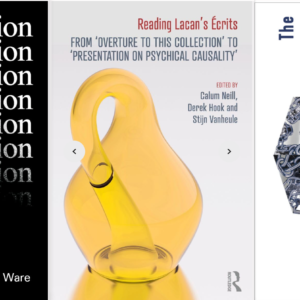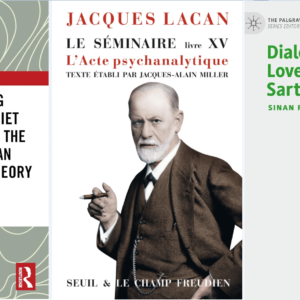News – March 2015
Lacanian Ink 45, the latest edition of the long-running journal, went to the printers in late March and is due to be released shortly. Number 45 takes ‘The Wicked Other’ as its theme and features three contributions by Jacques-Alain Miller, as well as Josefina Ayerza, the publication’s founder who also runs Lacan.com. For updates on the release date, follow the journal’s Facebook page. Alternatively, subscribe to receive each edition as it comes out, or browse previews of past editions on the site.
March saw the publication of Lacan on Madness: Yes You Can’t, a collection of essays by Lacanian scholars on the theme of psychosis, edited by Patricia Gherovici and Manya Steinkoler. The book features clinical case studies, new theoretical developments in psychosis, and critical appraisal of artistic expressions of insanity.
Trevor Pederson’s The Economics of Libido: Psychic Bisexuality, the Superego, and the Centrality of the Oedipus Complex was also published in March. Although not strictly a Lacanian work, it should also be of interest to anyone approaching psychoanalysis through a Lacanian orientation insofar as it proposes another ‘return to Freud’ through philosophy and,f like Lacan, undertakes a close reading of Freud’s texts. Pederson summarises his argument at the start of the book: “The central argument I make in the text, under the heading of social ontology, is that Freud gives a model of the personality that is built upon the primary relatedness of the individual through the drives. An individual doesn’t rationally choose to be ambitious, shy, arrogant, or kind based up value but, rather, these are part of his “psychological constitution” of the ego and object drives and their relation to the superego.”
Looking ahead, among the publications due out in April is Lacanian analyst Agnes Aflalo’s The Failed Assassination of Psychoanalysis: The Rise and Fall of Cognitivism. Following in a similar vein to Eric Laurent’s Lost in Cognition, which received an English translation earlier this year, Aflalo’s book is a critique of cognitivism and the ‘learning’ model that represents a rejection of fundamental psychoanalytic concepts such as the unconscious and the drive.
On the subject of cognitivism, clinical psychologist and psychotherapist Jay Watts published an excellent article in March on CBT – ‘Cognitive Behavioural Therapy Does Not Exist’. Her argument is that CBT only exists “as a political convenience”. Founded on an extremely facile conception of human subjectivity, CBT’s therapeutic approach – according to the Beck Institute that bears the name of the movement’s founder – aims to help people “to think more realistically and… behave more functionally”, and “to modify their distorted thinking”. Watts’ article argues that the dominance of this view has “sucked into the CBT vortex” theories that bear little or no relation to its central tenets (such as attachment theory and mindfulness), in order to satisfy the conditions for funding, grants, and students, which are dependent on demonstrating a worldview stemming from the cognitive-behavioural model.
Finally among the publications, S, the Journal of the Circle for Lacanian Ideology Critique, devotes its forthcoming issue to ‘Capitalism and Psychoanalysis’. Details of how to contribute to the journal, and links to download its previous articles, are on its site here.
Professor of Psychoanalysis at Ghent University Stijn Vanheule has put together a YouTube video demonstrating how the optical illusion of the inverted vase Lacan discusses in Seminar I works. Using two mirrors, one concave and one plain, the illusion creates the appearance that a bunch of flowers stood upright on a table are encompassed by a vase, which is actually inverted below the table, directly underneath the flowers:
Lacan uses this illusion in Seminar I (and continues to use it until Seminar X) to describe the nature of identification, and the relation between the libidinal drives and the ego. The viewer “will see the real image of the vase encompassing the bouquet, and will give a style and unity to it – a reflection of the unity of the body.” (Seminar I, p.123). Prof Vanheule has written substantially about this model before – read his 2011 article in Frontiers in Psychology online here.
Among the events, Marie-Hélène Brousse, Professor of Psychoanalysis at the University of Paris VIII, will be the guest speaker at the Irish Circle of the Lacanian Orientation’s seminar in Dublin on 18th April on ‘Women’s bodies in the analytic experience’. Brousse will be speaking as part of a series of seminars in preparation of the forthcoming WAP Congress in Rio on The Speaking Body.
Coming up in Rome in June is the annual meeting of the International Society for the Psychoanalytic Study of Organisations. Included in its programme are two sessions using Lacan’s work. Firstly on Weds 10th June with ‘Organisational Consultation & Coaching in a Network Society’ with Simon Western and Philip Boxer, followed by ‘Lacan and the Libidinal Economies of Organisations’ on Fri 12th June.
In the run-up to May’s NLS Congress on Moments of Crisis the school’s international affiliates have been conducting a number of preparatory events. In March, the major event was the Knottings seminar in Paris featuring a panel of Lacanian analysts, chaired by Lilia Mahjoub. Audio of the contributions (in French) are available via Radio Lacan, but Linda Clarke of the Irish Circle has recorded a summary for English speakers, which can be found further down this page. The School also continues to publish short contributions from Lacanian writers as part of its ‘Slashes’ vignettes. Read them in full through the NLS’s Messager.
Finally, Professor Dany Nobus, author of many fine books on psychoanalysis, and in particular Lacan’s work, has been appointed Chair of the Freud Museum London. He will be taking over from Professor Lisa Appignanesi on 6th May, the 159th anniversary of Freud’s birth.
Got news? Get in touch.





Leave a Reply